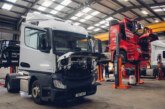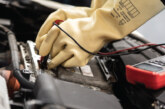
Shell Lubricants recently carried out a survey to provide insight into how Industry 4.0 is affecting the fleet and transport industry. The results suggest that some may be missing out on potential savings due to the growing knowledge gap associated with new technology. CVW finds out more.
Shell’s survey found that on the whole, UK fleet operators are optimistic about the transport industry’s rapid technological advances, with 96% expecting Industry 4.0 technologies to result in company savings.
However, the survey, conducted by Shell Lubricants, has revealed that as the pace of change builds, a knowledge gap around effective maintenance and lubrication, together with cost concerns, is hampering widespread uptake. In response, collaboration is key to unlocking progress, by helping companies realise the benefits of effective equipment maintenance and lubrication on the Total Cost of Operation (TCO) of equipment, which is the total amount spent on industrial equipment, including cost of acquisition and operation over its entire working life, and costs of lost production during equipment downtime.
96% of UK fleet businesses currently use at least one Industry 4.0 technology. Sensors (32%) and cloud-based technologies (38%) are most prevalent, while less than one in three (30%) are currently using autonomous equipment, although this statistic is likely to shift as driverless vehicle technology continues to develop. The industry is positive about the potential savings that these technologies could achieve, with key benefits seen as longer equipment life and fewer unplanned breakdowns.
Despite this optimism, concerns over costs and the pace of change are preventing upscaling. 80% of UK fleet operators are concerned that the costs of new technology may outweigh the benefits, leading to over two thirds (72%) being unwilling to upgrade while current machinery is still operational. This is compounded by a knowledge gap; 74% admit that a lack of understanding of new technologies is a significant challenge to their introduction.
Andrew Gibson, EU Fleet Sector Marketing Manager, said, “When thinking about how to maximise returns from new high-tech equipment, it is important that businesses look at the whole picture, rather than just considering up-front costs. This is where effective vehicle maintenance, including proper lubrication, becomes crucial. These regimes are vital to help companies maximise returns, and it is clear from the research that a knowledge gap is preventing this in practice.” While all fleet operators (100%) are aware that high-tech equipment will have different lubrication needs, only 36% would focus more on lubricant quality and just 32% would place more emphasis on products that provide equipment protection.
Andrew continued, “Effective lubrication can have a significant impact on component life, maintenance costs, and unplanned downtime, contributing to reduced TCO and improved equipment productivity for new equipment with a high purchase price.”
Companies are aware of the need for staff training in preparation for Industry 4.0 technologies, but 70% are concerned about difficulties in upskilling workers. With 92% planning to provide their own training as a solution to this, collaboration will be important. 88% of companies plan to use their lubricant supplier for this training, and 94% an OEM.
Advanced technical services from Shell Lubricants – including the LubeChat AI-driven mobile application to support lubricant selection and sensor-based equipment monitoring service, LubeSensor – are intended to help customers upskill their teams and provide the services they need to implement effective equipment lubrication.
Andrew concluded, “At Shell Lubricants, working closely with customers to deliver bespoke advice to help improve equipment maintenance and lubrication practices is at the core of what we do. Sharing expertise helps keep fleets competitive as they navigate the changes that lie ahead.”
What is Industry 4.0?
Industry 4.0 technologies are defined as technologies that support the digitisation and automation of operations (e.g. sensors, connected equipment, the internet of things, autonomous equipment, cloud based or big data-based technologies).
Some may refer to Industry 4.0 as the ‘fourth industrial revolution’.








